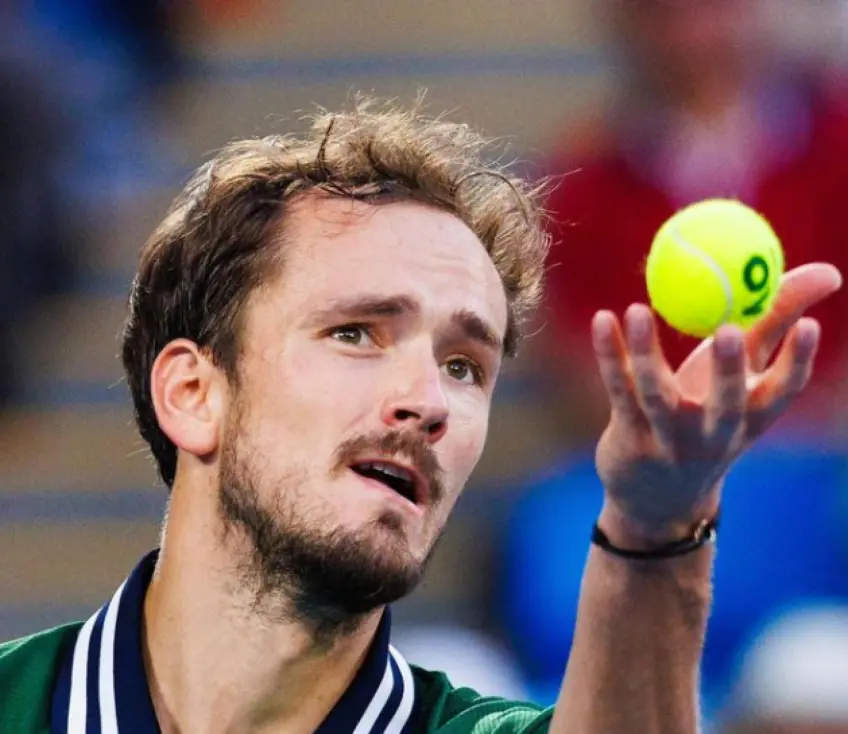
Daniil Medvedev stands at a crossroads in his career, facing significant challenges that demand introspection and transformation if he hopes to reclaim his place at the pinnacle of men’s tennis. After a meteoric rise that saw him clinch his first Grand Slam title at the 2021 US Open and ascend to the world No. 1 ranking, Medvedev’s trajectory has taken a concerning turn. The past twelve months have highlighted a noticeable decline, raising questions about his ability to adapt to the evolving landscape of the ATP Tour. With the retirement of Rafael Nadal and the gradual decline of Novak Djokovic, many expected Medvedev to seize the moment and dominate the field. However, the reality has been starkly different.
A Changing Landscape: The Rise of Alcaraz and Sinner
One of the most significant challenges Medvedev faces is the emergence of a new generation of tennis stars. Carlos Alcaraz and Jannik Sinner have redefined the competitive standard, displaying a blend of power, agility, and mental resilience that has disrupted the established order. Both players have enjoyed stellar runs, with Alcaraz capturing multiple Grand Slam titles and Sinner asserting his dominance in 2024, including a notable victory over Medvedev in the Australian Open final. This seismic shift has left Medvedev struggling to keep pace, his once-reliable game seemingly losing its edge against the relentless energy and innovation of the younger stars.
Medvedev’s inability to capitalize on key opportunities has been particularly glaring. His performance in 2024 underscores this point; despite reaching the Australian Open final, he failed to convert the chance into a title, falling short against Sinner in a match that exposed critical weaknesses. His campaign in subsequent tournaments was marred by inconsistency, culminating in early exits and a palpable sense of frustration. The Russian failed to secure a single title throughout the year, a stark contrast to his previous seasons of dominance. Losses to lower-ranked players highlighted his vulnerability and raised doubts about his mental fortitude and strategic adaptability.
Tactical Stagnation: The Need for Change
To regain his competitive edge, Medvedev must address several key aspects of his game. His baseline-centric style, characterized by deep defensive play and counterpunching, once set him apart. However, the game has evolved, with players like Alcaraz and Sinner combining aggressive shot-making with exceptional court coverage. Medvedev’s reluctance to adapt his tactics has left him increasingly predictable, and opponents have learned to exploit his defensive positioning.
Former French ace Gilles Simon, who joined Medvedev’s coaching team, initially injected a sense of tactical clarity. Simon’s analytical approach seemed promising, offering insights into the weaknesses of top opponents. Yet, as the season progressed, Medvedev’s performance waned, suggesting that deeper changes are necessary. Medvedev must develop a more aggressive approach, incorporating net play and shortening rallies to disrupt his opponents’ rhythm. His tendency to engage in extended baseline exchanges has become a double-edged sword, draining his energy and leaving him vulnerable to the explosive shot-making of younger rivals.
Mental and Physical Challenges
Another critical factor contributing to Medvedev’s struggles is his mental and physical condition. Former WTA star Dinara Safina recently commented on Medvedev’s state during the ATP Finals in Turin, observing, “He looked exhausted, like he didn’t care anymore.” This sense of fatigue has manifested in erratic performances and uncharacteristic lapses in focus. Medvedev’s notorious on-court outbursts and visible frustration reflect a player grappling with internal battles. Safina emphasized the importance of rest and mental reset, suggesting that Medvedev needs to step back and recharge before attempting a comeback.
Physical conditioning has also been a concern. While Medvedev remains one of the fittest players on tour, the relentless grind of the ATP season has taken its toll. His demanding style of play, which relies heavily on endurance and defensive resilience, requires peak physical conditioning. Any dip in fitness translates directly into diminished performance, particularly against opponents who thrive on high-intensity exchanges.
Path Forward: Strategic Adjustments and Coaching Influence
Medvedev’s decision to continue working with both Gilles Cervara and Gilles Simon signals his commitment to addressing these challenges. Cervara, who has been with Medvedev through his greatest triumphs, provides stability and continuity. Simon, with his tactical acumen and firsthand experience against top opponents, offers a fresh perspective. The key lies in integrating their insights into a cohesive strategy that emphasizes adaptability and aggression.
In a recent interview during the ATP Finals, Medvedev shared his thoughts on the evolving coaching landscape, downplaying the impact of on-court coaching: “I don’t think it can make a huge difference. It’s part of the game now, but ultimately, it’s about executing on the court.” This pragmatic approach reflects Medvedev’s belief in personal responsibility and self-reliance. However, the challenge will be translating this mindset into tangible improvements, particularly in high-pressure situations.
The Road to Redemption: 2025 and Beyond
Looking ahead, the 2025 season represents a critical juncture for Medvedev. His decision to skip tournaments before the Australian Open indicates a focus on preparation and strategic planning. Melbourne has historically been a stronghold for Medvedev, and a deep run there could reignite his confidence. Winning an early title would not only boost his ranking but also send a message to his rivals that he remains a formidable contender.
Medvedev’s journey back to the top will require more than physical conditioning and tactical adjustments; it demands a shift in mindset. He must embrace the challenge posed by the new generation, viewing it not as a threat but as an opportunity to evolve. The path to another Grand Slam title will be arduous, but Medvedev has the talent and experience to navigate it. His legacy is far from complete, and the next chapter could define his place in tennis history.
Leave a Reply